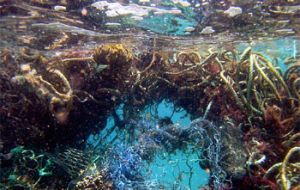MercoPress. South Atlantic News Agency
Ghost nets and lost fishing gear hurting marine environment
 Lost, discarded or abandoned fishing gear make up for 10 per cent of all marine litter
Lost, discarded or abandoned fishing gear make up for 10 per cent of all marine litter Large amounts of fishing gear lost at sea or abandoned by fishers are hurting the marine environment, impacting fish stocks through “ghost fishing” and posing a hazard to ships, according to a new report jointly produced by the UN Food and Agriculture Organization (FAO) and UN Environment Programme (UNEP).
According to the study, the problem of abandoned, lost or otherwise discarded fishing gear (ALDFG) is getting worse due to the increased scale of global fishing operations and the introduction of highly durable fishing gear made of long-lasting synthetic materials.
The report estimates that abandoned, lost or discarded fishing gear in the oceans makes up around 10% (640.000 tons) of all marine litter.
Merchant shipping is the primary source on the open sea, land-based sources are the predominate cause of marine debris in coastal areas.
Most fishing gear is not deliberately discarded but is lost in storms or strong currents or results from “gear conflicts,” for example, fishing with nets in areas where bottom-traps that can entangle them are already deployed.
The main impacts of abandoned or lost fishing gear are: continued catches of fish -- known as “ghost fishing” -- and other animals such as turtles, seabirds, and marine mammals, who are trapped and die; alterations of the sea-floor environment; and the creation of navigation hazards that can cause accidents at sea and damage boats.
Gill nets, fishing pots and traps are most likely to “ghost fish,” while long-lines are more likely to ensnare other marine organisms and trawls most likely to damage sub-sea habitats.
In the past, poorly operated drift nets were the prime culprits, but a 1992 ban on their use in many areas has reduced their contribution to ghost fishing.
Today, bottom set gill nets are more often-cited as a problem. The bottom edge of these nets is anchored to the sea floor and floats are attached to their top, so that they form a vertical undersea wall of netting that can run anywhere from 600 to 10 000 meters in length. If a gillnet is abandoned or lost, it can continue to fish on its own for months - and sometimes years - indiscriminately killing fish and other animals.
Traps and pots are another major ghost fisher. In the Chesapeake Bay of the United States, an estimated 150 000 crab traps are lost each year out of an estimated 500 000 total deployed. On just the single Caribbean island of Guadeloupe, about 20 000 of all traps set each year are lost each hurricane season, a 50% loss. Like gill nets, these traps can continue to fish on their own for long periods of time.
“The amount of fishing gear remaining in the marine environment will continue to accumulate and the impacts on marine ecosystems will continue to get worse if the international community doesn't take effective steps to deal with the problem of marine debris as a whole. Strategies for addressing the problem must occur on multiple fronts, including prevention, mitigation, and curative measures,” said Ichiro Nomura, FAO Assistant Director-General for Fisheries and Aquaculture. He also noted that FAO is working closely with the International Maritime Organization (IMO) in its ongoing review of Annex V of the International Convention for the Prevention of Pollution from Ships (MARPOL) as regards fishing gear and shore side reception facilities.
Achim Steiner, UN Under-Secretary General and UNEP Executive Director, said:“ There are many ‘ghosts in the marine environment machine' from overfishing and acidification linked with greenhouse gases to the rise in de-oxygenated ‘dead zones' as a result of run off and land-based source of pollution. Abandoned and lost fishing is part of this suite of challenges that must be urgently addressed collectively if the productivity of our oceans and seas is to be maintained for this and future generations, not least for achievement of the UN Millennium Development Goals”.




Top Comments
Disclaimer & comment rulesCommenting for this story is now closed.
If you have a Facebook account, become a fan and comment on our Facebook Page!